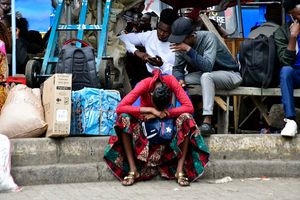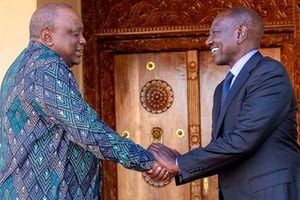
Kongomano la Mapinduzi activists at Mageuzi Hub in Nairobi on December 15, 2024. They said that they will hold peaceful processions in all counties to light candles on December 25 in memory of those who were killed in Gen Z protests.
Welcome to 2025, friends.
Will this year be as consequential as last year, one of the most important years in Kenya’s political history? The significance of 2024 will likely be missed because society is busy defusing former Deputy President Rigathi Gachagua and the great danger he represents not only to the regime but also to an entire political and economic strata, and implementing 2027 strategies, setting tribes against each other and other short-sighted but ultimately harmful activities common to politicians.
The events of June 25, 2024 must be viewed from the broader sweep of history. They represent an unresolved contradiction and are a landmine buried in the soil of society; this society will have to go back and defuse it, or risk stepping on it.
But let me first tell you a little about China. The Qing dynasty fell in 1912 with nationalist leader Sun Yat-Sen’s declaration of the Republic of China, ending 2,000 years of imperial rule.
However, there was a worm growing inside the Nationalist shoot. First, China was not a unified country, it was a series of fiefdoms ruled by powerful and, in the main, ruthless warlords.
Within the Kuomintang, the Nationalist Party of China, were two conflicting tendencies: leftist/communist figures like Mao, Deng Xiaoping and Zhou Enlai from the Chinese Communist Party and the more right-wing figures like Chiang Kai-shek. A split was inevitable, especially with Russian spies infiltrating the party and pumping CCP members with propaganda and money.
It happened on August 1, 1927 when the communists finally revolted, rising against the national government in Wuhan and forming an army of their own, the Red Army. After more than a decade of bloody conflict, on October 1, 1949, Mao formally proclaimed the People’s Republic of China and Chiang Kai-shek led the remnants of the nationalists to exile in Taiwan, where they established their own capitalist enclave.
The formation of a communist state, however, is more than a proclamation. The collectivisation of land and dispossession of tens of millions of property owners is disruptive on an almost cosmic scale. By the stroke of a pen, millions of people are moved from prosperous to abjectly poor.
During the 1958-62 famine, 36 million Chinese died. In 1966, Mao launched the Cultural Revolution, claiming that the party and government had been infiltrated by bourgeois elements intent on introducing capitalism.
Having eaten a century of bitterness and given the relative incompetence of communism in creating prosperity, there must have been pressure to sideline the architects of the communist experiment and relax some of its dictates.
Mao waged war against those perceived to have soured of communism till his death in 1976. Two years later, Deng Xiaoping, who took over, came up with the so called Four Modernisations: build world class agriculture, science and technology, industry and military. These reforms unleashed the wealthy, modern and powerful China that we know today.
The people, of course, wanted more. Even within the party, there are those, such as Hu Yaobang, the General Secretary, who wanted more democracy and by the end of the 1980s, students were in the streets and occupying Tiananmen Square in Beijing, demanding rights. Moderates such as Zao Zhiyang, who replaced Yaobang as party boss, proposed negotiating with the students for a peaceful outcome.
Hardcore communists Premier Li Peng and Deng decided enough was enough and called the military out to crush the protesters, which it did with uncommon brutality.
And so it has emerged that though China is not a democracy, there is a social contract: the party will not tolerate “bourgeoise liberalism”, euphemism for loss of power that democracy and human rights would entail.
But it would deliver great wealth and prosperity to the Chinese people, industry and technology as well as a military second to none in the world and make the country a world power that the Chinese people can be truly proud of.
The student protesters of June 25 in Kenya were making demands for a government based on maxims that are mile ahead of those that the Kenya Kwanza government was based on: Less tribalism and favouritism and therefore more merit and competence, more patriotism and less selfishness, more respect for citizens and their rights, an end to the festival of insults and slaps and more decorum and civility.
True, there are some strong, positive, economic outcomes that show the economy is stabilising. And accelerating savings as a way of reducing foreign borrowing is a good idea.
But some of the other policies, like the 1940s Keynesianism of public works creating jobs and excessive taxation as a path to growth are highly debatable. In any case, people who are terrified of being abducted are unlikely to notice that interest rates are coming down. Neither does it create conditions for people to be proud of their country and to give of their best.
I suppose what the Gen-Zs expected was for the powers-that-be to press the reset button and set the country on a different path. I suppose they would have to wait for that – if at all.
But we can study history so as not to miss – even if we ignore – the moment.










